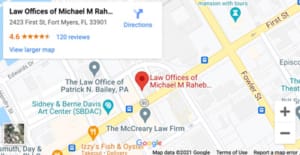Can My Social Media Posts Harm My Child Custody Case?
Many people who are going through divorce rely on the support of family and friends to get them through the emotional distress. Social media offers a convenient way to interact with loved ones, but you never know who is reading your posts.

Family lawyers have clued into the fact that Facebook and other social networks offer a wealth of evidence to use in divorce cases. In fact, social media content is now used as evidence in nearly two-thirds of divorce cases.
Your child custody attorney may advise that you deactivate your social network profiles until your divorce has finalized. Otherwise, your spouse’s child custody lawyer may use the following content as evidence against you:
- Status updates;
- Photographs;
- And professional network profiles.
If you are facing divorce, turn to the Law Offices of Michael M. Raheb, P.A. As your child custody attorney in Naples, Michael M. Raheb can help you avoid making mistakes that could compromise your interests, such as discussing your divorce online.
Call 866-949-0888 to schedule a free consultation. You can also learn about divorce proceedings in Florida by visiting www.USAttorneys.com.
Here is a brief overview of three types of content that may be used as evidence in a divorce case:
- Status Updates
Status updates that you post on Facebook and other websites are usually admissible as evidence in court. You should never post an update about your case; in fact, it is best not to update your status until your divorce is finalized because it is not always easy to tell if a status update could harm your case.
- Photographs
Do not post photographs of you or your children online while your divorce is pending. A seemingly innocent image could make a judge question if giving you physical custody would be in the children’s best interests. This may be true if a photo causes the judge to question your mental health or the safety of your home environment.
- Professional Network Profiles
The information you post on professional networking sites, such as LinkedIn, is usually admissible as evidence in court. Your spouse’s child custody attorney may review your profiles to find details about:
- The position you hold at your company;
- Your employment status;
- And if you are searching for new employment.
This information may be used as evidence if there is an income-related dispute, such as disagreements related to child support.
If you are facing divorce, you should consider disabling your social media profiles until your case has finalized. At the very least, modify your privacy settings so only your friends and people in your networks can view your profile. Also, ask your friends and family members not to post photos of you or information about you on social media sites.
If you are facing a child custody battle in Florida, contact the Law Office of Michael M. Raheb, P.A. Mr. Raheb is a Naples child custody lawyer who can protect your interests. Call 866-949-0888 today to schedule a free consultation.




































